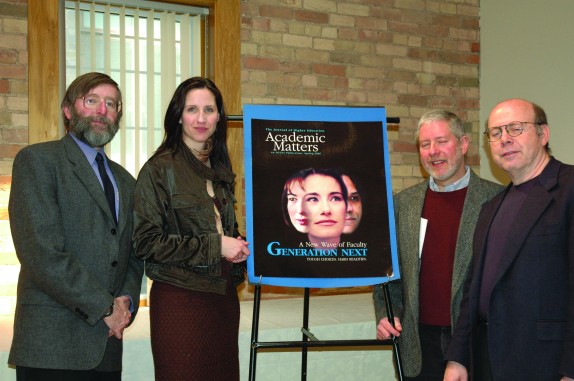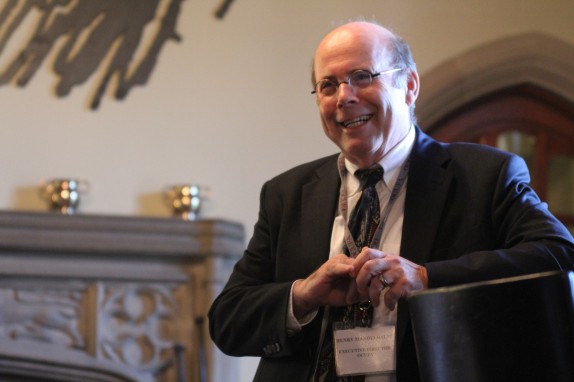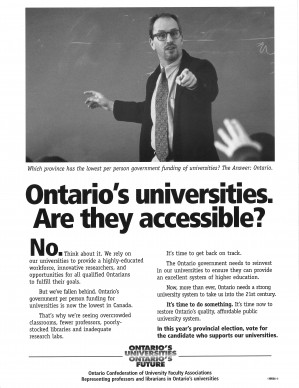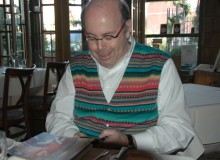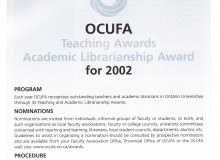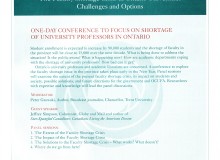
Higher Education in the 21st Century:
New Challenges
The new millennium brought different kinds of challenges to the post-secondary sector and to faculty. These challenges included demographic changes, such as the impact of the double cohort and the “baby boom echo” on university enrolment; the resulting expansion of the university system; the impact of technology on teaching; new staffing models, particularly a significant increase in part-time and non-tenured faculty; and the pending retirement of thousands of faculty members.
Deborah Flynn
The “Reaching Higher” years
Dalton McGuinty’s Liberals took over the reins at Queen’s Park in 2003. In its first budget that year, the new government signalled a significant shift in approach to the challenges facing the post-secondary system. It promised to create spaces for 50,000 more students, freeze tuition fees, and expand access to student financial aid.
In 2005, former Premier Bob Rae was asked to lead a review of the design and funding of post-secondary education in the province. The resulting report, Ontario: A Leader in Learning, explored five themes — accessibility, quality, system design, funding, and accountability — and made 28 recommendations for change.
Four months after the release of the Rae Report, the government outlined its “Reaching Higher” plan for investment in post-secondary education, including an investment of $6.2 billion over four years, the largest made to the system since the 1960s. This funding injection was welcomed, yet it was still not enough to overcome the severe cutbacks of the late 1990s.
Launch of Academic Matters April 2006. From left: OCUFA President Michael Doucet (2003-2007), Associate Editor Trish Hennessy, Editor Mark Rosenfeld, and Executive Director Henry Mandelbaum. Photo courtesy Michael Doucet.
OCUFA rises to the challenges
A newly reinvigorated OCUFA responded to these changes in a number of ways. Support for faculty collective bargaining was increased significantly. The organization also held a series of communications and lobbying workshops for member associations, and began commissioning targeted public opinion polls, asking Ontarians what they wanted the higher-education system to achieve. OCUFA used these data to educate and inform its members, the public, and government officials.
New campaigns and publications were launched as well. OCUFA’s 2007 “Quality Matters” campaign was the beginning of a longer-term strategy to ensure that faculty had the resources they needed to give all students the highest-quality education possible. A new magazine, Academic Matters, was launched in 2006 to explore current trends and relevant issues in higher education. OCUFA also began focusing attention on a wide range of issues, including low funding levels (by the early 2000s, per-student funding in Ontario was the lowest in Canada), high student–faculty ratios, and the continuing challenge of maintaining access to university for Ontario students from all backgrounds
OCUFA’s then-Executive Director Henry Mandelbaum at his retirement party, June 2011. Courtesy Joel Duff.
OCUFA also played a major role in the eventual elimination of mandatory retirement in Ontario in 2006, an issue that had been ongoing for many years. And the organization was instrumental in the extension of freedom of information legislation to the universities.
OCUFA’s links to other organizations solidified as well, as the organization worked with student organizations and labour unions on a number of communications and advocacy campaigns.
OCUFA election campaign ad, 1999.
I think the main role that OCUFA plays is acting as a voice for academics, of course, but it also has a significant role in terms of lobbying the government about education issues related to universities. This central role lets our members know that politics is important.
Chair, OCUFA Grievance Committee, 2013–14
Tess Hooks
OCUFA did really important work bringing to the attention of government and opposition parties, as well as the general public, the role that postsecondary education plays in not only the life of Ontario but its economy. It’s a very important role for OCUFA to be playing in terms of keeping postsecondary education front and centre, to the best of its ability.
OCUFA President, 2003–07
Michael Doucet
I think the main role, and a central role, that OCUFA plays is acting as a voice for academics, and particularly faculty academics. And they have taken a significant role in terms of lobbying the government on issues related to education and the universities.
They’ve tried to ensure that there was a voice there for academics.Chair of the Grievance Committee, 2014, OCUFA
Tess Hooks
I learned that communications is very important and that if you got into the important newspapers like the Toronto Star, the Globe and Mail, and the National Post and you criticized something they were doing, then the government would pay attention to you and things would start to happen.
President of OCUFA, 2000–03
Hank Jacek
Videos
Photos
- Interior of OCUFA’s offices at 83 Yonge Street, 2004. Photo courtesy Michael Doucet.
- Exterior of OCUFA’s offices at 83 Yonge Street, 2006. Photo courtesy Michael Doucet.
- Exterior of OCUFA’s offices at 27 Carleton Street, 2006. Photo courtesy Michael Doucet.
- Executive Director Henry Mandelbaum at OCUFA’s holiday lunch, December 2006. Photo courtesy Michael Doucet.
- Associate Executive Director Mark Rosenfeld at OCUFA’s holiday lunch, December 2006. Photo courtesy Michael Doucet.
- Russ Janzen and Lisa Alexis at OCUFA’s holiday lunch, December 2006. Photo courtesy Michael Doucet.
- OCUFA staff, May 2007. Front row, seated, left to right: Henry Mandelbaum (Executive Director), Lisa Alexis, Rose Marie Stapleton, Amy Dickieson-Kaufman. Standing, left to right: Karat Tenbrinke, Russell Janzen, Donna Gray, Wendy Cuthbertson.
- Program for OCUFA’s Annual Teaching Awards and Academic Librarianship Award, 2002.
- Program for OCUFA’s Hire Education conference, 2001.





